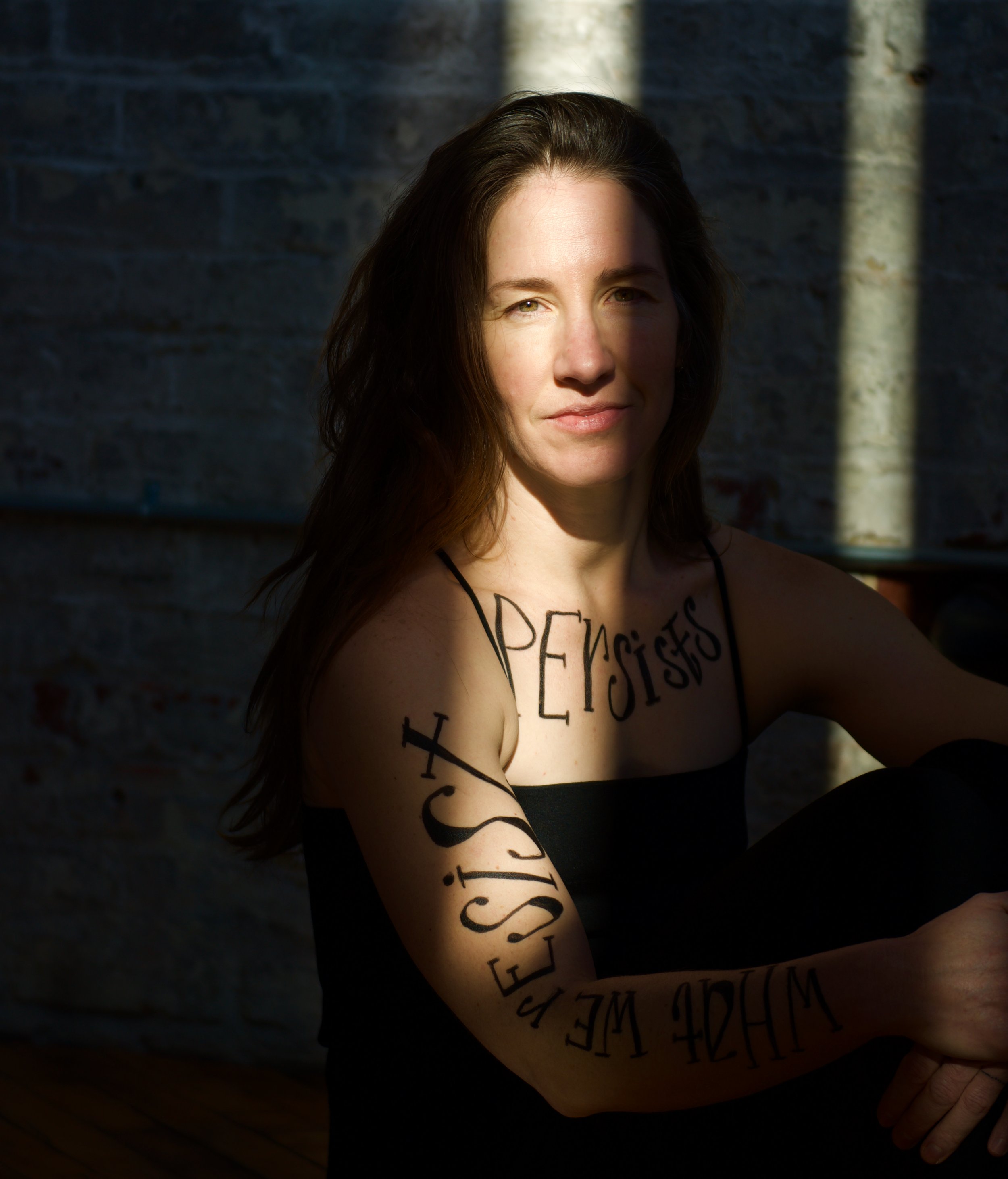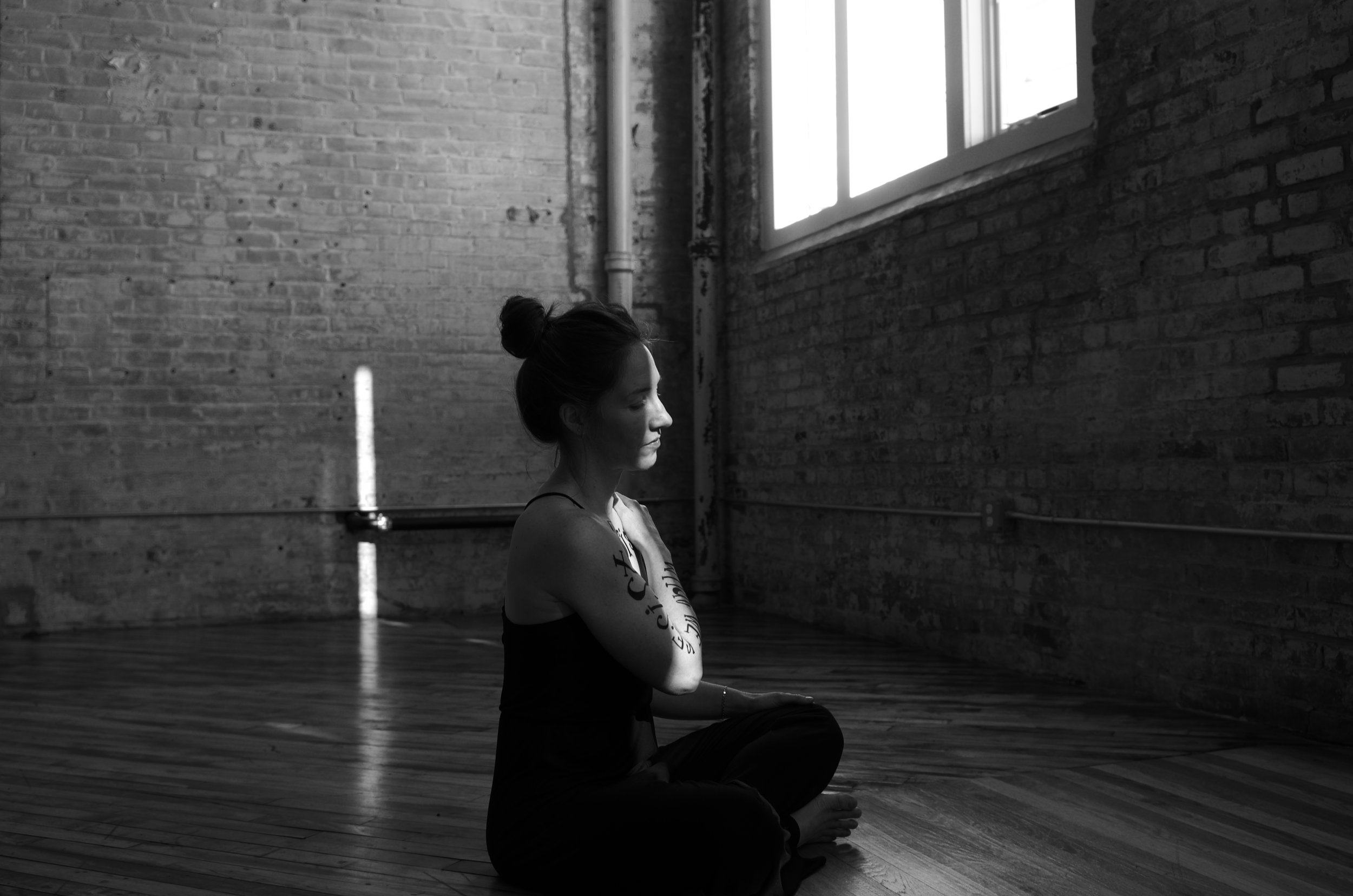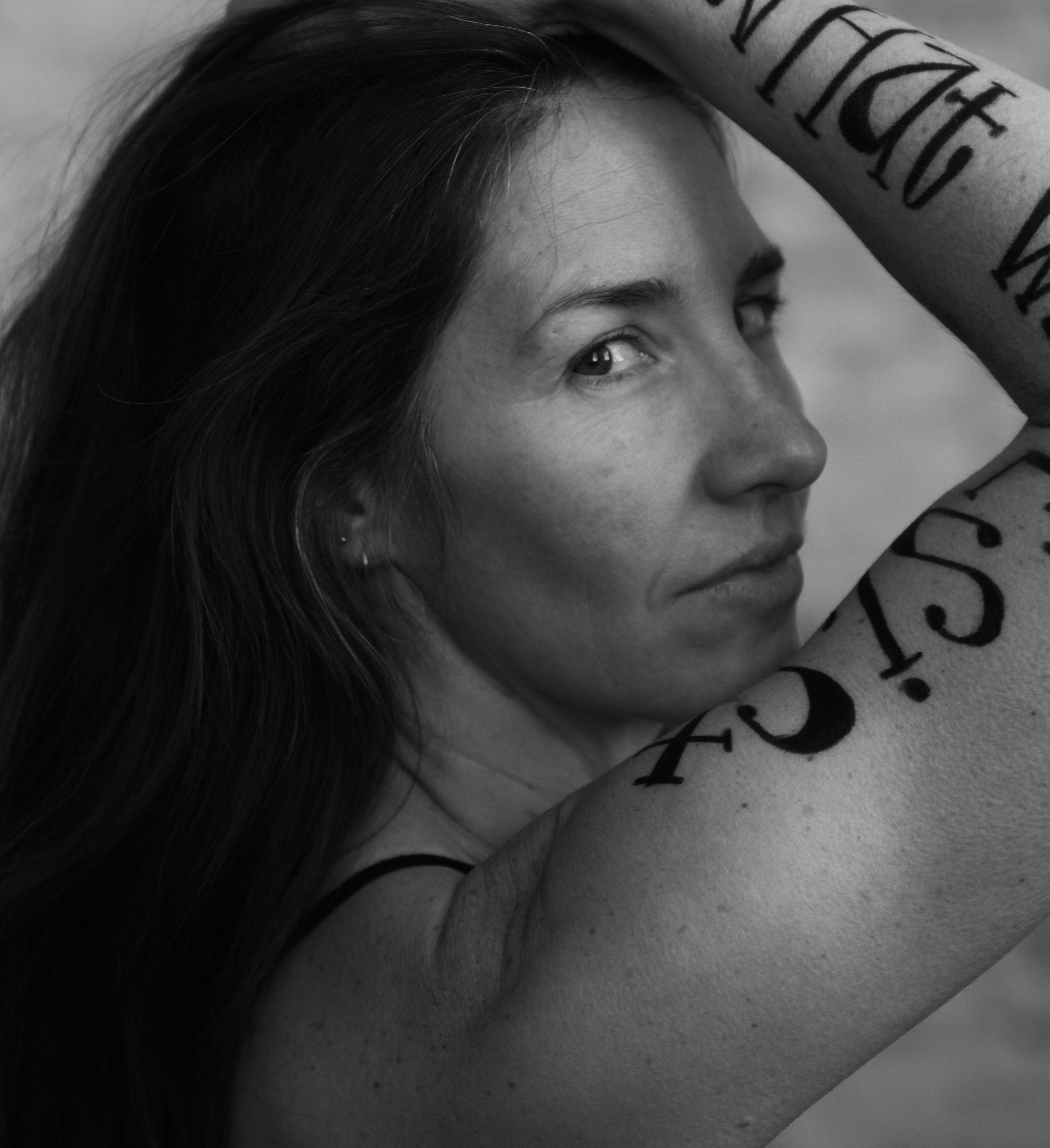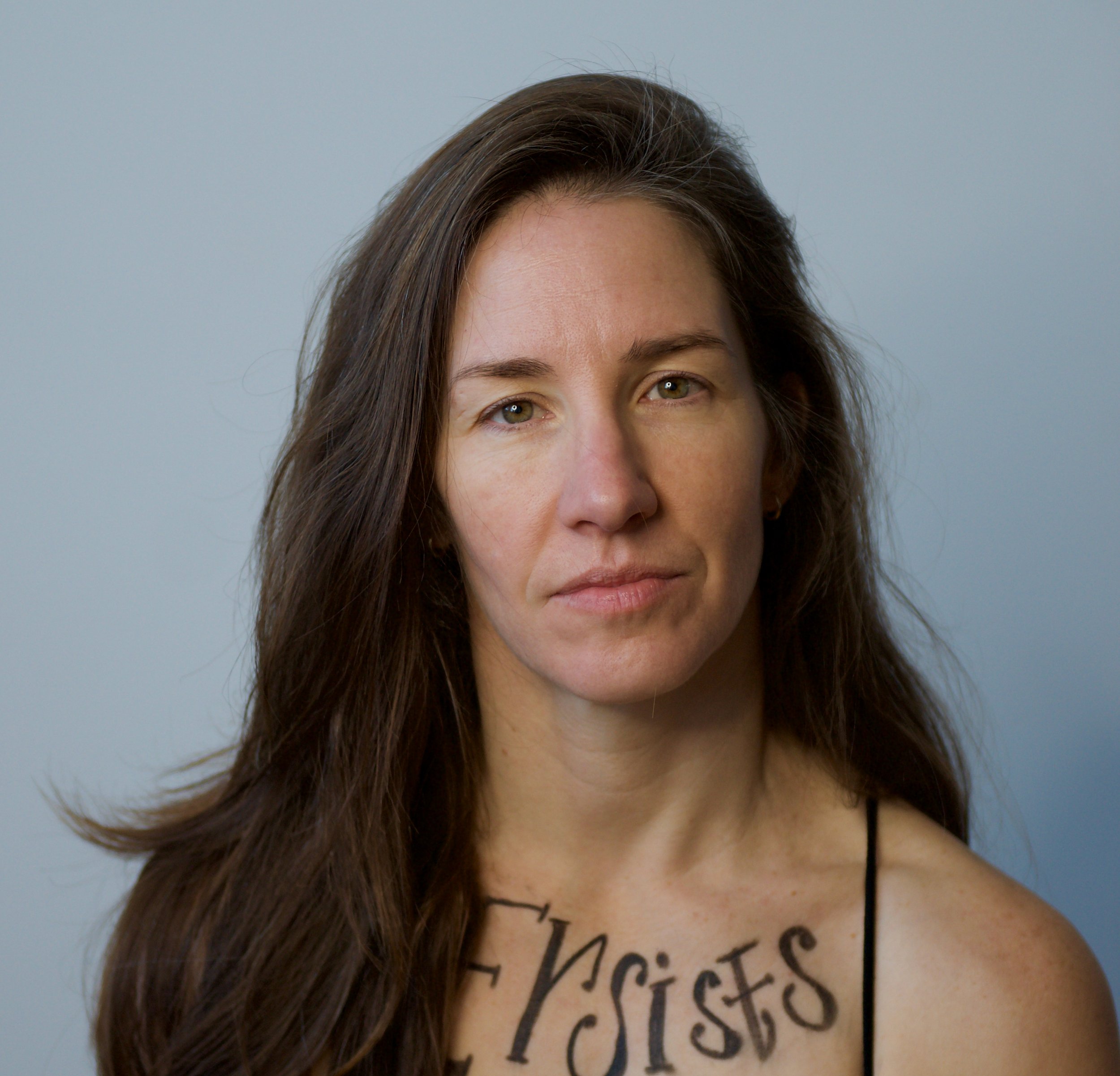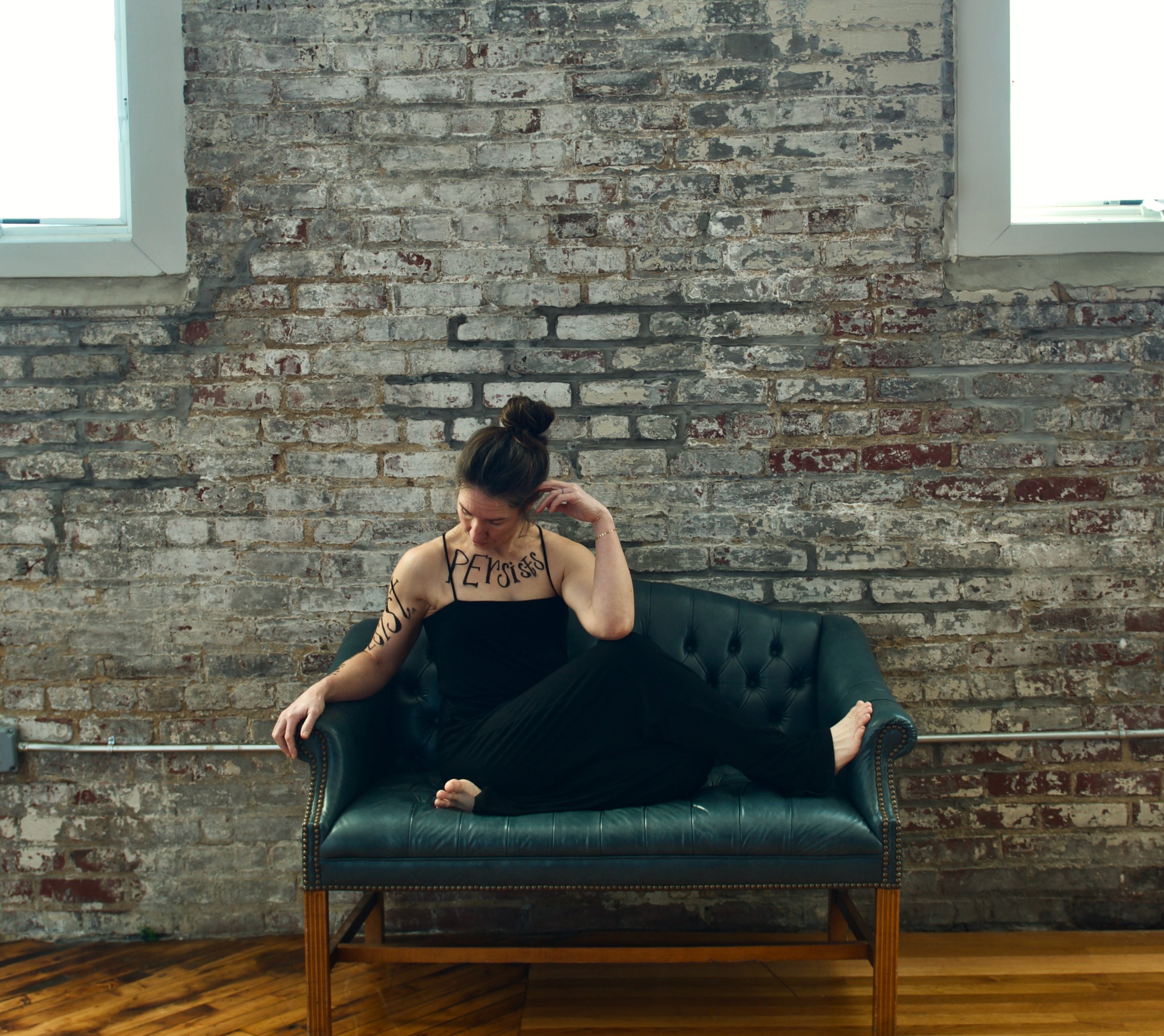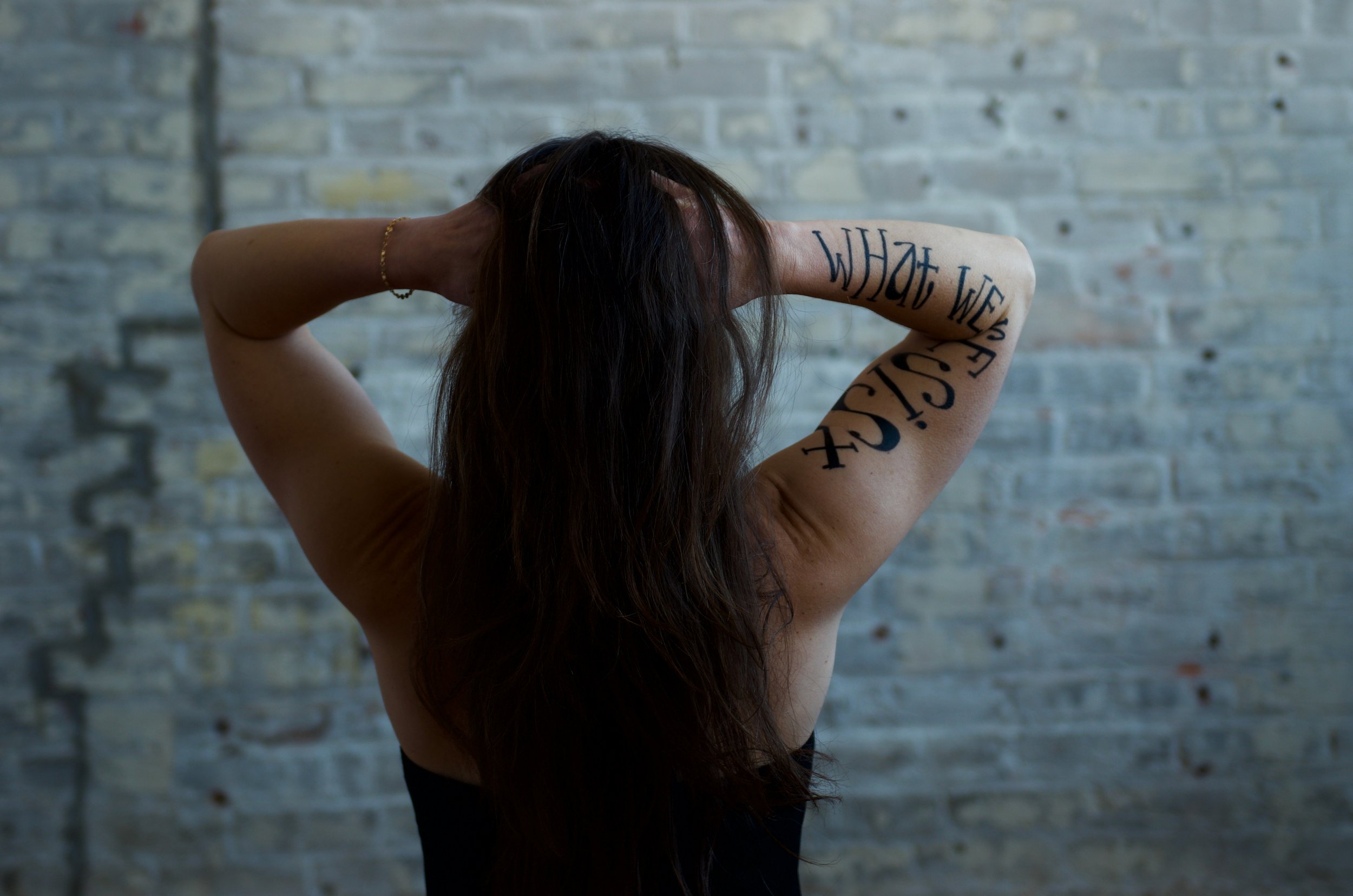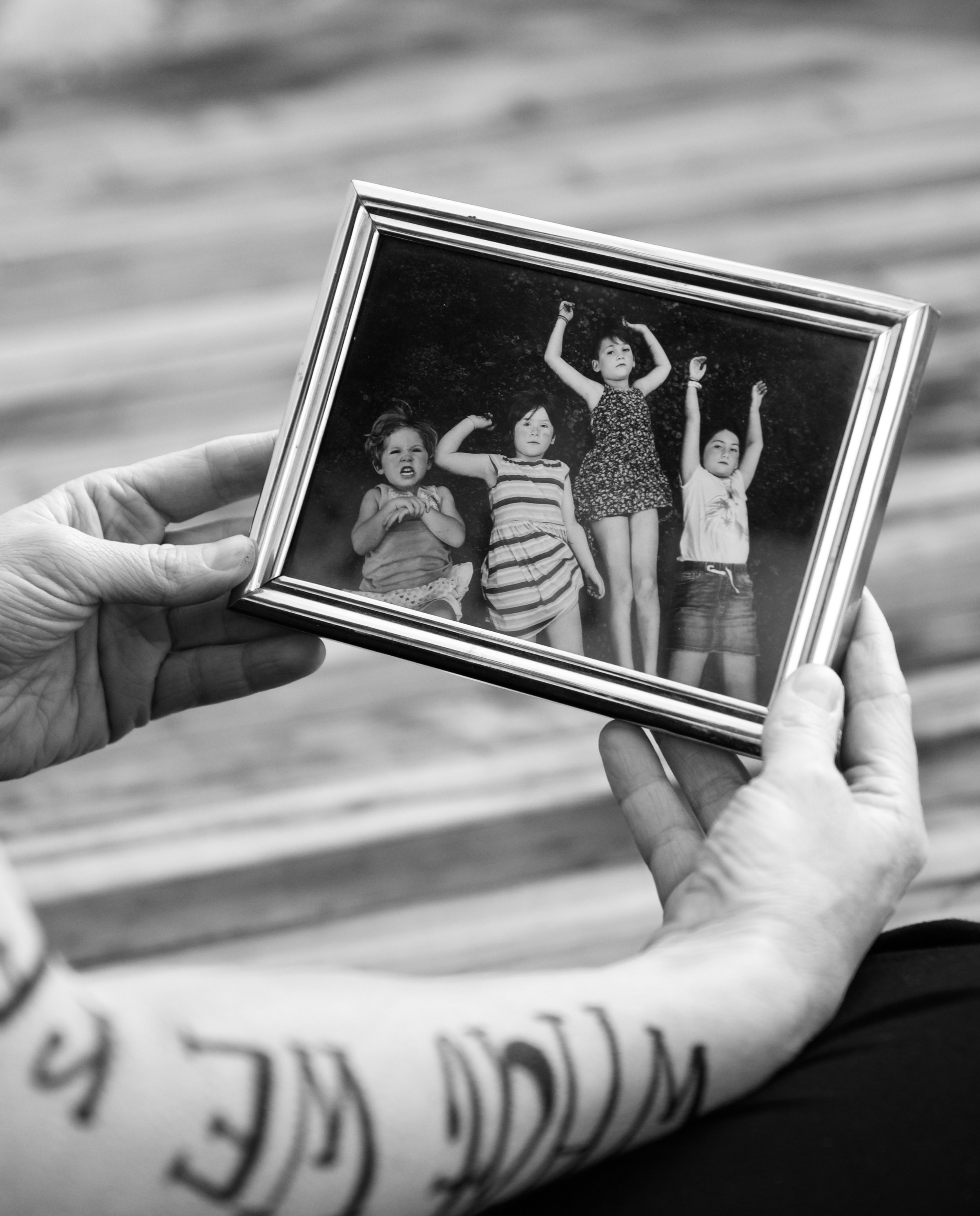Meg
“What we resist persists.”
-Carl JungWhen you’ve gone through a hard thing and come out on the other side, it’s never fully done; you’re always carrying little pieces of it. But for me, I never wanted my assault to be the place where I got stuck. I never wanted it to be the central part of my story. The further away I got from it, the less and less I talked about it, because it had already taken up so much of my time and energy. So much time and energy, and so much work. But along the way, reading about other people’s experiences with similar things was very helpful, so if my story can help somebody else, I want to tell it.I know it’s very common to feel this way, but there was so much self-blame. It took years of self-talk to undo that feeling. I carried a little note in my purse for three years that said, “It’s not your fault.” And I had to look at it every day until I believed it.It was hard not to feel like I had missed signs, like I had missed warning signs. Like I had not acted quickly enough to defend myself. Like maybe I had done things to invite the situation. Now I know that none of that is true. But at the time, when I was 26 or 27, I didn’t know that it wasn’t true. I kept it all pretty buried until I had my daughters. And then I started thinking - what if this happened to them? Of course it would never be their fault, you know? Of course it would never be their fault. Of course they would never ask for that.
That’s when I was able to turn that feeling onto myself for the first time. It was very empowering and healing to have children and to come into this role of guardian and protector. To see that nobody had protected or guarded me. And that it wasn’t really up to me, because the power dynamics were such that I couldn’t… you know, it was my boss. He was the principal of a high school, and I was a brand new teacher. And honestly, there was a moment when it was happening, when the assault was underway, that I had this thought of, “Oh, this is what sleeping to the top means. This is how I’m going to keep my job. I wonder if this is why I got hired.” And then I kind of felt complicit. I felt complicit for just being in the room. For… for being a body in the room. For just existing as a woman. For existing as a woman in a predominantly male space. I felt like I had invited this.I still had to go to work afterwards. It had happened right at the beginning. Right at the beginning. We were on a spiritual retreat for new teachers. And we were on an island. One of the behaviors that remains today from this trauma is that I no longer go anywhere that I cannot leave myself. So, if I meet friends somewhere, I usually bring my own car. I have to have an exit strategy that does not depend on anybody else’s availability or desire to leave. When it’s time for me to go, I need to be able to leave. This is one holdover from that event that still affects me today.
I will never be marooned again. I will never be locked in a position of abuse again. I was literally on an island, and I couldn’t get off. It happened at night, and I had to spend the whole next day praying. We were in prayer and learning about Jesuit history and group sharing about our intentions as teachers going forward. And it’s amazing how well you can appear to function, you know? I literally just dissociated. I was there but not there.
I didn’t say anything for a long time about the sexual assault because I was afraid. I was afraid of the stigma that would land on me, of the harm it would do to the community that centered around this man, and I was afraid for his family. And I guess I was afraid of being hated - by him, by the community, and by all of the people who were not going to believe my story. I feared that if I said anything, I’d lose my job. And it was a hard time. I felt so lucky to have that job. I think that’s part of what made me vulnerable. It’s part of why I think I was targeted. I was just so fucking grateful to be there. I do believe there was some calculation in his mind that I would be unlikely to say anything.
It’s what predators do. It’s what they’re really good at. It’s classic.
And I… I was just a single girl in Montreal. My family wasn’t there, I wasn’t part of a clan. Nobody was going to come beat the school door down and demand an explanation. I was just easy prey. I was trying so fucking hard at that job, and I wanted to fit in and prove myself. So there was probably a desperation about me that made me an attractive target.
You have to wonder how many times he’s gotten away with it.I’ve never really talked about this part, but I think another reason I felt like I couldn’t complain was because I wasn’t fully raped. I was heavily groped in my bed. I was kissed all over my face by a drunken man. I pushed him off, and I escorted him out, and I tried to get back under the covers and go to sleep, but he came in again and took all of his clothes off. So, I wasn’t physically… I wasn’t raped. I had this feeling like somehow it wasn’t the “real deal.” That I didn’t actually get assaulted. I anticipated conversations like, “Well, did he rape you?” “No…” “Oh, ok, then what’s the matter?” You know? And that certainly came up. How assaulted was I? I don’t know, I’m just starting a new job, I’m sleeping alone in a room, and I’m having visitors in the middle of the night. I mean yeah, I wasn’t raped, but it was fucking traumatizing.
And I think it really took me seeing the event occurring to my daughters to fully see how very wrong it was. I couldn’t do that for myself, but when I imagined it happening to them, I was able to access the anger that I should have felt all along. I couldn’t get mad for myself, but I could get mad on behalf of somebody else, and then I was able to transfer it to me.
In a way, that was a homecoming. It helped me realize that I’m a person worth protecting too. And I think my story before had been that I wasn’t entitled to protection.Right when I got back from the retreat, I did tell my roommate. She, and a select few others, were the only people who knew for a long time. I was going to a Presbyterian church at the time, and I told my mentor. Her name was Madonna, she was an older businesswoman, and she was very nice. I think when I spoke to Madonna I was hoping… because she’s savvy, she’s in business, and she’s a woman, I think I was hoping she would maybe have an answer as to what I should do.
She was very empathetic and very sympathetic, but she just shrugged her shoulders and said, “I guess there’s nothing you can do.”
It was like, “Oh well…” And so then I just felt like, I guess this is what it is. I guess this is what it is to be a woman at work.
And all the while, I’m trying to be a brand new teacher, which in itself is extremely demanding. I was trying to manage a classroom of 25 boys and stay on top of the curriculum, and plan, grade, coach, mentor, tutor.
And so, for the rest of my 20s, I was a little bit numbed out, and I tried to avoid it all. Avoid the thoughts, avoid the story, and avoid the incident in my mind. I was always running away from it. Literally and figuratively.
I was doing a lot of physical running in that period. Hard running. I’d go on these hard, fast runs where I’d just try to beat it out of my body.
It was like a physical exorcism.I think it was the years of yoga that followed that helped me decide to fight. I think it was the years of daily practice, nervous system regulation, and building a wholeness within myself. Over time, I began feeling like I had access to all the parts of my body, that all the parts of my body integrated with my brain, and that they all moved as one. It just made me feel stronger. It made me feel like I could withstand whatever stress was going to arise from pushing back against the system of patriarchy and misogyny. I was correct in knowing that attempts were going to be made of calling me a liar and of shaming me, and that was true, but I felt like I just had the physical and mental strength to withstand it.
And I also realized that whatever strength was required to withstand it was less than the strength required to keep on carrying it.
In my late 20s, I got married to my husband, Andrew, and we moved to New Zealand for a year and then to California. I just created a lot of space for myself from what had happened. Gaining geographical distance increased my sense of safety by a lot. I think if I had stayed in Montreal, I may not have ever done anything for fear of seeing the people involved and for fear of bumping into the whole community who would then know. I think knowing that I would never have to see anybody again dropped that barrier of fear quite a bit.
When we got back from our time in New Zealand, the school called me. It was a woman from HR. She said she was calling to catch up, she asked if I could send her pictures of our time abroad, and she was congratulating me on being pregnant. At the end of our conversation, she asked me casually if I wouldn’t mind signing an NDA about what had happened at the staff retreat. I don’t exactly know when she first found out, but that was the first time that I realized that the school was aware of what had happened, that they knew it was a big deal, and that they knew it was wrong.“What we resist persists.” I realized that if you never look the thing in the eye and you keep running away, it simply gets bigger and bigger.
I made the decision to take action. Although it was hard, it was also easy, because my actions now aligned with my values. When you go to your workplace, you need to feel safe. And now I was doing something to make sure that my old workplace was a degree safer.
I made a call to my stepmother-in-law, Barbara, who is an immigration lawyer. I knew she couldn’t help me, but I thought she might have a contact who could. And it was tricky, because I was now in my mid-30s living in California, and this had happened in my late 20s in Canada. There was a statute of limitations that was problematic. But Barbara was very helpful, and she put me in touch with the right kind of lawyer who could help me. And so we started by sending a letter to the principal’s home, and then it started a back and forth of his lawyer answering, then my lawyer answering… it went on like this for a while. It was a lot of, “What you said happened didn’t really happen… It wasn’t that bad… All your dates are wrong… You are attacking an upstanding citizen who is a family man…” You know, implying that because he had status and had achieved a lot, that my claim… not that it couldn’t be true, but that it was an affront to his status and accomplishments. Like, how dare I. That was the tone. It was crazy. The papers they sent me were long and full of legalese… I still have them. I never look at them. I remember when I read them, my hands were shaking. And I was like, “Oh, so this is the abuse people talk about in the legal system. Here it is. I’m trying to operate through the system to help myself, and I’m being revictimized. Fuck.”
And then it came down to dollars. How many dollars, they asked, was I willing to go away for? And I was just like, this isn’t what I was trying to do. This is… I don’t… there are no dollars. There are no dollars that make this go away for me. I just found that part - the assignment of a numerical currency - I don’t even know the word for it. It was outrageous. Are you $20,000 upset, or are you $25,000 upset? How many dollars upset are you? At that point, I just called my lawyer and said, “I don’t want to do this anymore. This isn’t the way.” And he was supportive. I think this is probably pretty uncharacteristic for a lawyer, but he said, “You know, you’ve got to follow your heart.” He said, “Go with your gut.” And I was like, “My gut says this process is bullshit and won’t fix anything.”As I mentioned, while all of this was going on, Ashtanga yoga was an incredible healing force for me. But in 2018, right around the time I had started litigation, and right after I had had my fourth child, I received some incredibly upsetting information.
Ashtanga yoga was popularized in the 30s by a man from India named Pattabhi Jois. He had been a student of Krishnamacharya, who is sometimes referred to as the father of modern yoga. Pattabhi Jois was young and strong, and Ashtanga yoga is a vigorous yoga for a healthy person. Jois had a large following of Westerners who would take what they had learned from him to their home countries of the US and UK, which is how the style became well-known and more widely practiced. And people practicing Ashtanga were encouraged to make regular pilgrimages to Mysore India to spend time with the guru. I didn’t personally believe in doing that, but he was our guru - the Ashtanga guru.
In 2018, I first became aware of the stories of how he had abused his students. Three or four women had come forward about Pattabhi Jois having molested them in front of an audience of yoga practitioners. He’s dead now - all the accusations came out posthumously. And I think most people tried to rationalize away what happened or denied what their own eyes were seeing, because nobody wants to question their practice or have to shift their stance on a person they admired and spent a lot of time trying to emulate.
And suddenly I was faced with the realization that for me, and for so many people like me, Ashtanga yoga had been this healing tool, while it had also harmed women in the same way I had been harmed.The news of Pattabhi Jois’s abuse fractured the yoga community and sort of divided people into several camps. There was the “I don’t believe the stories” camp, there was the “I don’t care” camp, and then there was the “This happened, and it’s a problem” camp. And I’m sure you can guess where I fell. But, you know, I was already managing a lot of emotions as this story dropped. It just dropped into this swirling pot of bubbling emotions, and I had a hard time separating what had happened to me from what had happened to these women. I felt very personally affected by a) what Patthbhi Jois had done, and b) people’s denial of what had happened. It was… I couldn’t not take it personally, I took it very very personally. And I had this friend who’s a smart woman. She was an entrepreneur and had been a journalist, and she texted me that it was “the epitome of narcissism for me not to be able to separate the events of my life with this event that had occurred.” This was kind of when I decided I couldn’t really sustain my friendship with her anymore. But I did think about that a lot; it was a challenging proposition. Would I have felt as strongly as I did about what happened if similar events had not happened to me? I don’t know. I don’t know. There’s so much you just don’t know. And I don’t know if I was such a strong advocate of the need for change because of the facts or because of my experience. But what I do know is that I was among people who had not been sexually abused or harassed but who felt as passionate about this as I did.My friend Philippe and I pushed our studio to publish a statement acknowledging what had happened and outlining ways in which we were going to try to avoid replicating the culture and environment in which those kinds of things occur. We also reached out to a number of senior teachers asking them to maybe make a statement of their own or just talk to us about their experience. That part was disappointing, because they weren't ready to talk about it yet. There was a lot of shrugging - “That’s just the way it was… Everybody knew.” Everybody knew. It’s crazy. I mean, that’s your fucking answer?
I remember practicing in a studio space where I taught, and Pattabhi Jois’s picture was on the altar. I remember practicing with his picture on the altar for a few weeks. I just left it there, and I tried not to look at it. But eventually I couldn’t stand it anymore and I just… it wasn’t my studio, and I let the studio owner know what I had done, but I had to remove the picture. I just couldn’t stand to do one more practice with him watching me.
My yoga practice became a very heavy practice for about a year, because I just felt so much grief. I felt a lot of grief about it. I just felt heavy in my chest. And then sometimes I felt really mad, and I would have this vigorous, violent practice. Just kind of throwing my body into the postures. But I think I just moved it out of my system that way.
There was a point where I almost quit Ashtanga altogether. But ironically, it’s what saved me. So you know, I had to do the mental gymnastics of trying to separate the man from his creation. I found some reassurance in the fact that while Pattabhi Jois popularized Ashtanga, he was not the person who created it. But who knows about how far back abuses like this go. It doesn’t surprise me anymore. It’s almost expected now. It’s crazy, and it sucks for men who would never dream of behaving that way. I mean, it really hurts everybody.My ex-boss had been heavily invested in the Jesuit Catholic system for much of his life. I don’t know his story, but I’ve wondered. I felt bad for him, isn't that stupid? I felt bad for him for so long. I was like ugh, what if this comes from his own abuse?
At one point in my processing of everything, I got myself a therapist. There were just too many things. Too many things, and I didn’t know how to help myself get through it. And I had to take care of four little babies. But I’m really glad I did. My therapist was a great match for me. And talking to her was hard and exhausting, but it was also very helpful. Just the fact that I had done something to try to help myself, that alone made me feel better. Even if she hadn’t been good, just the fact that I had called somebody for help did a lot for me.In 2019, when I was 40 years old, I was about halfway through my yoga practice for the morning, and I was coming out of a posture that was very strenuous for me at the time. And as I got out of the posture, I felt… different. I didn’t know what it was, but I decided to leave the room and catch my breath; I thought I was just lightheaded. But then I came back, and I got onto the mat in down dog, and I couldn’t see my right hand. I kept sort of turning my head to try to find my hand, and then I noticed that nothing on my right field of vision was visible. So I got down on my knees, and I was staring at my hands, and my friend Philippe was next to me, and he said something to me. I think he said, “Are you ok?” or “Good morning”... I don’t even know what he said. I couldn’t even… I couldn’t process it. I couldn’t quite hear him; there was rushing in my ears. I just was not sure what was happening. I don’t want to say I was panicking, but I was definitely perplexed. Just puzzled. Like, what’s going on?
So I went out into the lobby and sat down, and the teacher came out and asked how I was doing. And that was when I… I went to answer her, but I couldn’t. I had aphasia. I couldn’t say words. And then fortunately Philippe came out, and he knew something was up. He called his father-in-law who was a doctor, and he asked me a couple questions. I was able to indicate yes or no, and his father-in-law was like, you’ve got to take her to the hospital right away. And I was having visual issues. I could see everything there was to see, but I couldn’t assign meaning to things. Like, I went to put on my shoes, and I saw all the shoes, but I couldn’t identify my own. And I knew my shoes were there, I knew what they looked like, but they all meant the same thing. It was really weird.When we got to my car, Philippe told me to open the door. And I was just looking at the handle, and I knew I couldn’t manipulate it. I just knew I could not put my hand on the handle and open the door. So he came around, he opened the door, I got in, and then he’s like, “Your keys, your keys!” I remember opening my purse, and there’s a phone, a wallet, and a set of keys inside, and I knew they were distinct objects, and I could see they were distinct objects, but I didn’t know which ones were the keys. So he’s like, “You don’t know which ones are your keys?!” I just handed him the purse. I was like, “Here,” and he just grabbed the keys, and we drove.
They CT scanned me almost as soon as I got to the hospital, and I was having a full on stroke on the left side.
And I remember they told me what was happening - yep, you’re having a stroke - and I was able to understand everything people were telling me. Apparently, there had been a blood clot in my heart that had shot through the dividing wall of the heart and had gone up to my brain. They explained to me that it was in the language center of my brain, which is why I couldn’t speak, and I was starting to lose feeling in my right arm and leg, which made sense. Things were progressing. So they gave me tPA to break up the clot, and I slowly started getting all my faculties back. I don’t know what the timeline was, I don’t know whether it was 45 minutes or 2 hours or what, but eventually Philippe left, and Andrew came. I remember Andrew got to the hospital, and he was sitting in the hospital chair with his face in his hand, in a kind of a defeated posture, with this resigned look like, “Oh my God, we’re in hot water here.” And I just returned the look, like yes, we are in very hot water.
All I wanted was to ask him how the girls were. All four of those girls were so little, you know? I wanted to ask him, “Where are the girls? How are they doing? Who has them?” but all I could say was “Cats.” So I was like, “Cats… cats…”
And Andrew said, “The girls are fine.”
There was an interesting moment where I considered that I might be at a fork in the road. I was seriously thinking about what it would mean to parent as a person who couldn’t speak or use her right arm. Part of me was like, well, thank goodness I’m not breastfeeding anymore; my kids are all big enough to physically survive if I die. I remember thinking that. I was like, none of them are newborns, so that’s good. I imagined Andrew as a widower dad. Or at least, a man who had to take care of four kids and a wife. And that happens to people. And I was really relieved it didn’t happen to us. So, yeah. There wasn’t in fact a fork. But we kind of hovered over that. I remember trying to test how far along I was in terms of recovering from my deficits by mouthing the alphabet. In the beginning, I couldn’t get past D. “A, B, C, D. ABCDABCD…” I kept waiting for the rest to come. And then they have all these neurological tests they do, and they just keep coming back to you every five minutes to see if you can identify more of the images on this page. They’re like, “Ok, which of these… Can you say this? Can you say that? Can you say that? Can you say that?” And at first I had one. But by the end, I had all of them. But it took a while. It took a while.
This whole experience made me process the fact that we aren’t guaranteed any amount of time - you need to do the things you want to do. And what I really wanted to do was to teach yoga. I had been waiting for permission, and I decided to grant myself the authority. Especially since the powers that be seemed, perhaps, not as ethical as I had hoped. It felt like a bit of a farce. Who’s holding control? Who is granting the permission? At what point do I decide that I know enough and I’m good enough? That was the point for me. Enough. Enough faffing around, enough waiting. Let’s do the thing.
I did, and I am.Every year, I try to write a Christmas letter to my friends and family near and far. We’ve moved so much and everybody’s so dispersed, that I like to try to connect once a year. And the year everything happened with the litigation and the stroke in August and my subsequent heart surgery in October, I decided to disclose my experience with the assault to everyone in our holiday letter. I sent it to everyone I knew. And so everyone got this letter about my experience, how the legal system was a joke, and how I just felt there really was no justice for violence against women. It felt like there was just no way to get justice for what had happened to me.
Soon after this, I had some friends visit from Montreal. They are some really dear friends, Tom and Mel, who I love so much, and Tom is a journalist. I told them the story of all that had happened, and Tom was really quiet and pensive. He then asked me if they could put the letter on Facebook anonymously. And with my permission, they did. They said, “This is our friend’s story.” And the comments on the post were so kind and so supportive. All of the people commenting were strangers to me. I don’t know who they are, and I never will. But there were people offering me free somatic therapy, and all kinds of generous things - people who didn’t even know me. And I mean, that… that was so lovely. I hadn’t gotten the system to change at all at that point, but I think being seen, having my story heard, that did a lot to make me feel healed.A friend who knew that the story on Facebook was mine forwarded it to a Jesuit friend, and that’s when things started to happen.
On January 23, 2020 - my birthday - a layperson for the Jesuits of Canada called me to say that they had seen my social media post, and they wanted to talk. They were going to be removing Paul from his position, and reparations were going to be made.
It was the best. It was the best.
Honestly, at that point, the healing had already started for me. Making the choice to fight for myself had made me feel better, even before I knew the outcome. The icing on top was that he did lose his job and had to step down. Of course, they allowed Paul to leave with grace. You know, he left “to spend more time with his family.” Which is why, whenever I hear that, I am very skeptical. To me, that’s code. It’s code for some fucking bullshit went down.
I am really really grateful to the power of storytelling, because the litigation resulted in a total dead end. But my story, told from my perspective, outlining my experience, that is what catalyzed an organization into action. It was definitely a big takeaway for me - that stories are very powerful. Telling an honest story is scary, because it leaves you feeling vulnerable. If people know what happened to me, are they going to feel sorry for me? I really don’t want that. And so it’s tempting to not tell the story at all. But then the opportunity for someone to see themselves in my story, and to maybe see a way out of their current story, is lost.My experience with my assault definitely continues to impact my life in certain ways. It affects how I parent my four daughters. For instance, I’m so sensitive about touching and body autonomy. I stress to my girls that they should not hug a person without asking their permission first. I know kids do that to each other sometimes, but I’m always underscoring to them that they must ask permission so that they expect permission be asked of them. Things like that. Things like not gaslighting yourself. If you feel like something’s wrong, don’t tell yourself it’s because you’re anxious or sensitive. Something’s probably wrong. And you should probably get the hell out of there. Go find some people that you trust. If you feel like something’s wrong, something’s wrong. Those kinds of conversations are definitely a direct result of my experience.
I imagine when my daughters are teenagers, I’ll want to grab them by the shoulders every time they leave the house, look them in the eye, and say, “If you don’t feel safe, know how you can get out of there - have a way to leave.” But I also don’t want them to feel like there’s potential for them to be unsafe everywhere they go. Even though sometimes I feel like that’s the reality. There are going to be things that happen to them that are out of their control - that they have nothing to do with. Things we can’t prepare them for. Things we aren’t anticipating.I almost chose the quote, “Fear isn’t the enemy. Waiting to stop feeling afraid is. Spending too much time trying to analyze or neutralize your fear will only keep you exactly where you are,” by Marie Forleo, but it felt too long for this project.
It’s that second line that really hits me. “Waiting to stop feeling afraid.” You’ll never stop feeling afraid. We carry our fears, and they don’t go away just because we’re not looking at them or because we’re ignoring them. Fears don’t resolve on their own through neglect. And the longer you feed the habit of looking away from those feelings, the better you get at it. We get better at what we practice, even if it’s a harmful practice. Even if it drains your energy all the time. “What we resist persists.” And I can’t just keep dodging fear or circumstances that make me feel afraid; I have to just lean into that feeling and do the scary thing anyway.
It can persist generationally too. In my family of origin, I can tell you that’s definitely true. There’s a lot of heartache and denial and sweeping things under the rug. It just manifests itself with certain behaviors that get learned over time.
I think now, I see fear as an indicator. You know, as an emotion that is telling me to pay attention to something that I’m avoiding. This applies to things that are not trauma related, too. Just everyday life things. Fear is tricky, and I don’t pretend to have it all quite figured out. But sometimes I think, can I think of fear as excitement instead? Yeah, maybe I’m scared about offering this yoga workshop or claiming to be somebody who can teach this… but maybe that’s also excitement. Both feel like this electricity that can be heart jolting or motivating. Maybe in reframing it this way, I can motivate myself to run towards it, instead of doing everything I can to make sure I avoid it.It’s not hard to tell my story, and it’s not hard to imagine other people learning about it. I know it’s already out there in the world. So this actually isn’t that hard. It’s just hard to go back there. Because I don’t. I move forward, and I have other projects, and I keep working on myself, you know?
Sometimes the thoughts will still come up. The thoughts of, “I’m not worth protecting,” or “Maybe it was a little bit my fault.” These are stories I used to hold. This is where a meditation practice has been very nice for me, because it has taught me to catch those thoughts while they’re happening, so I can put the breaks on them. I’m more able to reject these ideas before they’re internalized.
I think the power of meditation and yoga is exactly that. It’s seeing the contents of your mind. Really seeing them. Instead of just being the contents of your mind.
